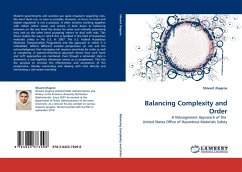Modern governments and societies are quite impatient regarding risks. We want them out, as soon as possible. However, to focus on more and tighter regulation is not a panacea. It often involves working together with others (other values and actors). It boils down to balancing between on the one hand the desire for order and radically preventing risks and on the other hand accepting 'others' to deal with risks. This thesis studies the way in which this is handled in the field of hazardous materials safety in the U.S. in 2007. The U.S. Federal Hazardous Materials Transportation Programme and the approach in which it is embedded, reflects different societal perspectives on risk and the acknowledgment that managing risk requires sensitivity for order as well as complexity. A systems-theoretical approach shows how such 'hard' and 'soft' approaches are combined. Even though a rationalist style is dominant, a non-legalistic dimension serves as a complement. This has the purpose to increase the effectiveness and acceptance of the programme, thereby preventing and dealing with risks directly and stimulating a risk-aware mentality.








